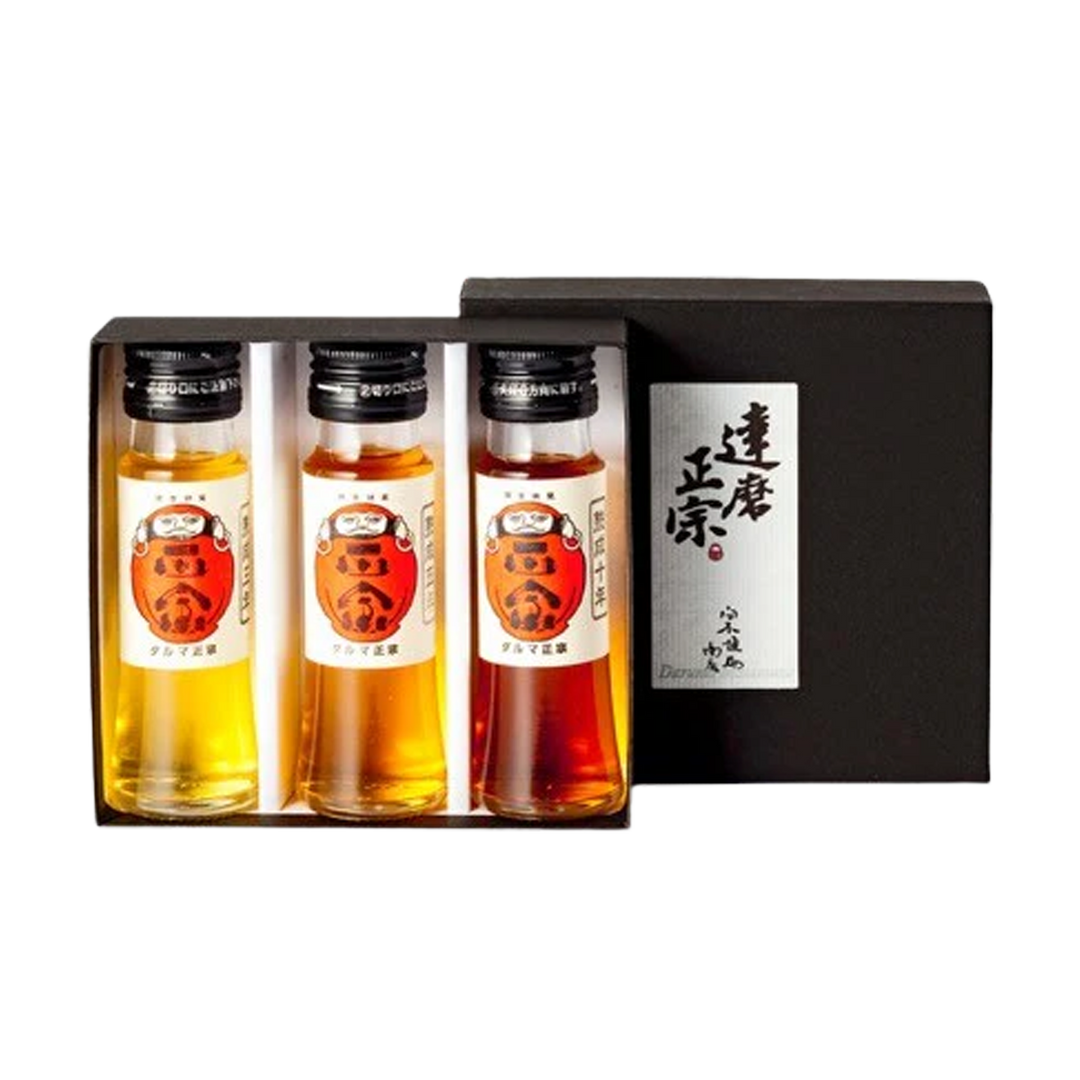
Daruma Masamune Koshu Set (3-5-10 year)
- In stock, ready to ship
One of the most highly respected koshu specialists in Japan. Throughout much of the industry, it's not an exaggeration to say that Daruma Masamune = koshu as they have been focused almost exclusively on aging since 1971. We're so excited to be offering a limited number of these 3-pack flight sets, taking you on a tour of sake through the ages: 3 year, 5 year, and 10 year, aged in enamel (glass-lined fiberglass) tanks and blended (in most cases) to bottle. There are some specific vintage designate sake, and once a sake is destined to pass 10 years and carry into 20, 30, and the rare 40+ year old releases, it is rebottled in 1.8L glass and kept under careful temperature watch in the Summer, being blended and rebottled only when it is ready for release. As koshu is the singular focus of Daruma Masamune, they nurture countless tanks to ensure there is supply 10, 20, 30 years into the future.
"In the 1960s, when we were thinking about how to survive as a sake brewery, we found a forgotten 1.8L bottle in a corner of the brewery. When we opened it, it had a beautiful golden color and a mellow taste. After researching, we found out that aged sake (koshu) existed from the Kamakura period to the Edo period. However, it disappeared during the war due to liquor taxes. Although I was called "an eccentric who makes sake but hoards it and doesn't sell it," I persisted, and have been making koshu for over 50 years. Now it has become recognized in countries around the world.
Some people have a simple question: "Isn't aged sake just unsold?" However, at our company, we brew the sake with the intent to age it for long periods. The rice used for brewing is mainly Nihonbare, a variety primarily used for eating. Recently, we have also been using Gohyakumangoku from Gifu prefecture for the koji. In the Edo period, when koshu was considered to be the most desirable, expensive sake on the market, there was no such thing as "sake rice." So in honor of this heritage we are particular about using table rice for koshu.
Daruma Masamune is aged at room temperature. In Gifu's climate, the temperature inside the brewery is at least 4 degrees in winter, and around 26 degrees in summer because it is an earthen storehouse with natural insulation. As the sake is slowly and carefully aged, a beautiful color gradually appears from the amino acids and sugars derived from the rice, and the sake's flavor becomes rounder.
If the sake is to be aged for more than ten years, it is bottled in a 1.8L bottle and stored in a container at room temperature. In summer, each container is cooled with well water to prevent the temperature from rising too much. The carefully aged sake is then blended (except for vintage designate bottlings). Blending is a craft only performed by master brewers who are well versed in the house style and possess an extremely honed palate." daruma-masamune.co.jp
Want to learn more? The brewery released a short song video (yes really!)
Shiraki Shuzo
Gifu City, Gifu, Japan
Classification: Junmai
Rice: Nihonbare
Polishing: 70%
Other: this sake is a blend, so the flavor profile is consistent year to year but other manufacturing details may vary, such as starter method, koji percentage, and so on. As a result, technical information is limited.
An excellent backstory has already been written by author and sake researcher, Jim Rion: https://yamaguchisake.com/2020/10/07/daruma-masamune-koshu-study/
I highly recommend giving it a read! Until I have the chance to do my own research, I'll be pointing in this direction.
A little cheese, nuts (nut-based cheese for that matter!) some charcuterie and a little aged sake, makes for a very nice happy hour.
From the brewery: "It is well-balanced enough to drink on its own, but because this sake is aged for three years, it is creamy, so it would be interesting to enjoy it with creamy chicken dishes or cheeses. In terms of Japanese cuisine, it also goes well with tempura and yakitori."
ANA airlines has also used Daruma Masamune in their Business and First class dishes, usually in applications where you'd usually see sherry or madeira, such as fond de veau. It's an excellent application for this sake, as the flavor is concentrated enough to really penetrate the dish with umami and caramelized notes.



